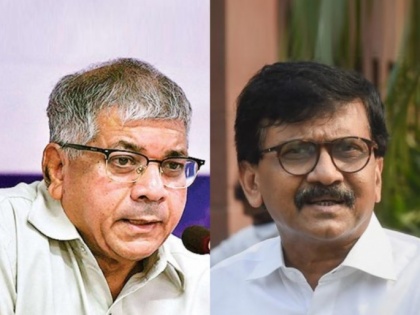Maharashtra Lok Sabha Election 2024: MVA Still Interested in Holding Seat-Sharing Talks With Prakash Ambedkar, Says Sanjay Raut
By Lokmat English Desk | Published: April 2, 2024 03:49 PM2024-04-02T15:49:48+5:302024-04-02T15:50:25+5:30
On Tuesday, Shiv Sena (UBT) leader Sanjay Raut expressed that the Maha Vikas Aghadi (MVA) is still interested in ...

Maharashtra Lok Sabha Election 2024: MVA Still Interested in Holding Seat-Sharing Talks With Prakash Ambedkar, Says Sanjay Raut
On Tuesday, Shiv Sena (UBT) leader Sanjay Raut expressed that the Maha Vikas Aghadi (MVA) is still interested in holding seat-sharing talks with the Prakash Ambedkar-led Vanchit Bahujan Aghadi (VBA), despite the latter having announced candidates for numerous Lok Sabha seats already.
Raut reiterated his call to abolish electronic voting machines (EVMs) and revert to paper ballots for elections, arguing that the BJP would face consequences if voting continues to be conducted via EVMs.
Prakash Ambedkar had been engaged in discussions with the MVA, which includes the Congress, the Nationalist Congress Party (led by Sharad Pawar), and the Shiv Sena (UBT), regarding the Lok Sabha elections. However, he recently declared candidates for 20 out of the 48 seats.
The Sena (UBT) leader claimed that Ambedkar’s party stopped talks with the MVA, which had given it a proposal for five seats, including Akola, Ramtek, Dhule and a seat in Mumbai. We were not the one to stop the dialogue with the VBA. On the contrary, we are still keen on holding talks with the party, he said.
In the 2019 Lok Sabha elections, VBA candidates often secured third place in several constituencies, while nominees from the Congress or NCP (prior to their split) came in second. This suggests that votes were divided, ultimately benefiting winning candidates, largely from the BJP and Shiv Sena (prior to their split).
Open in app